First time at a Language Exchange?
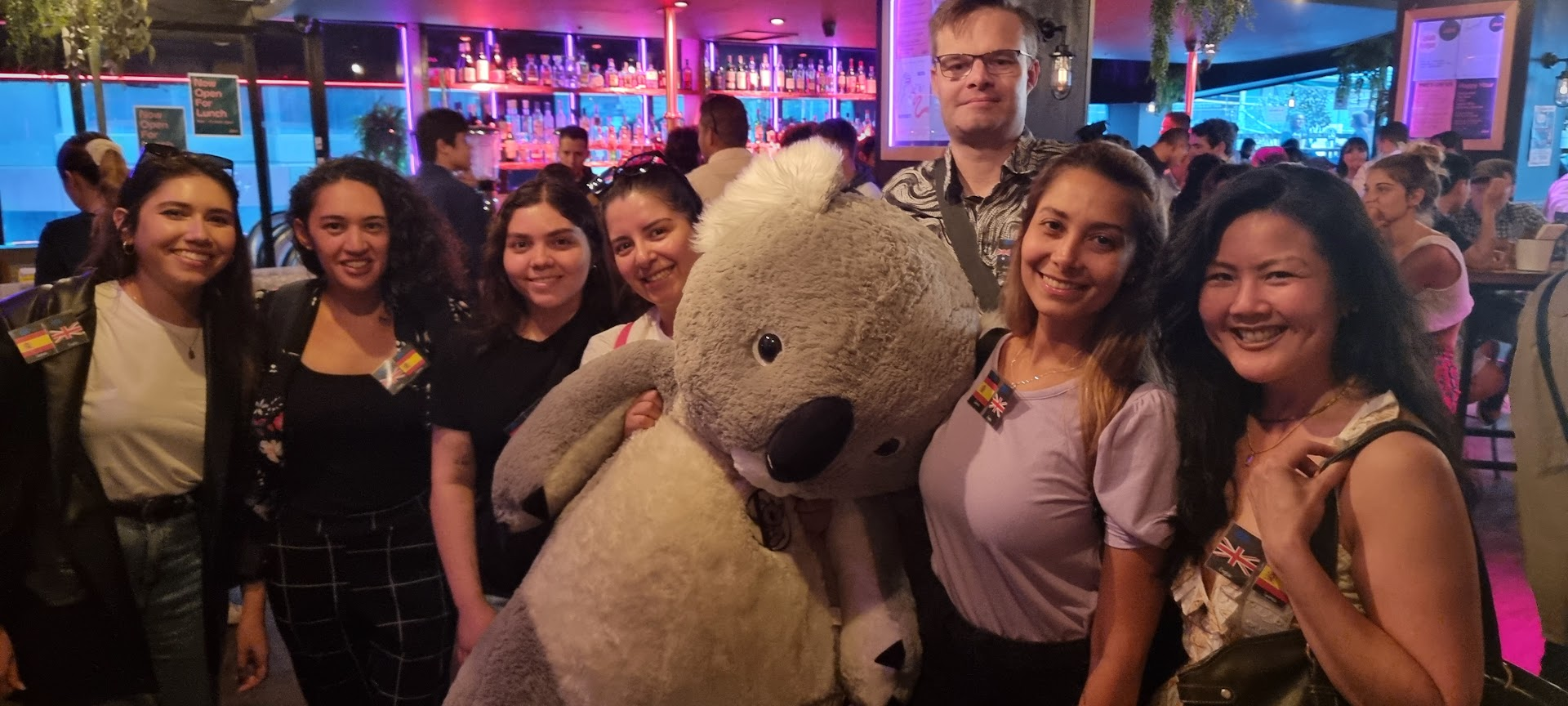
I've been organising language exchanges since around 2016. At this point I've attended over 300 language exchange events, seen many people connect and make friends for the first time and learnt a lot about how to get the most from a language exchange when attending - some of which I'm sharing in this article.
Occassionally, past attendees send me messages months or even years after attending my event, telling me they met a best friend or (more often that you would expect) their fiance at my event. So language exchagnes can be incredibly rewarding if you go in with the right mindset.
But before we cover my tips for the event, let's look at the basics of how the event works (in case you've never been to one before):
How it works:
People meet at a language exchange, share languages and make friends - that's the basics. People often talk about their country and culture, simple. At my events (and many other language exchanges), you get a "badge" or sticker with at least 2 flags - one flag for the country you are from and the other is the langauge you are learning. This really helps attendees easily find the nationalities / languages they are there to meet.
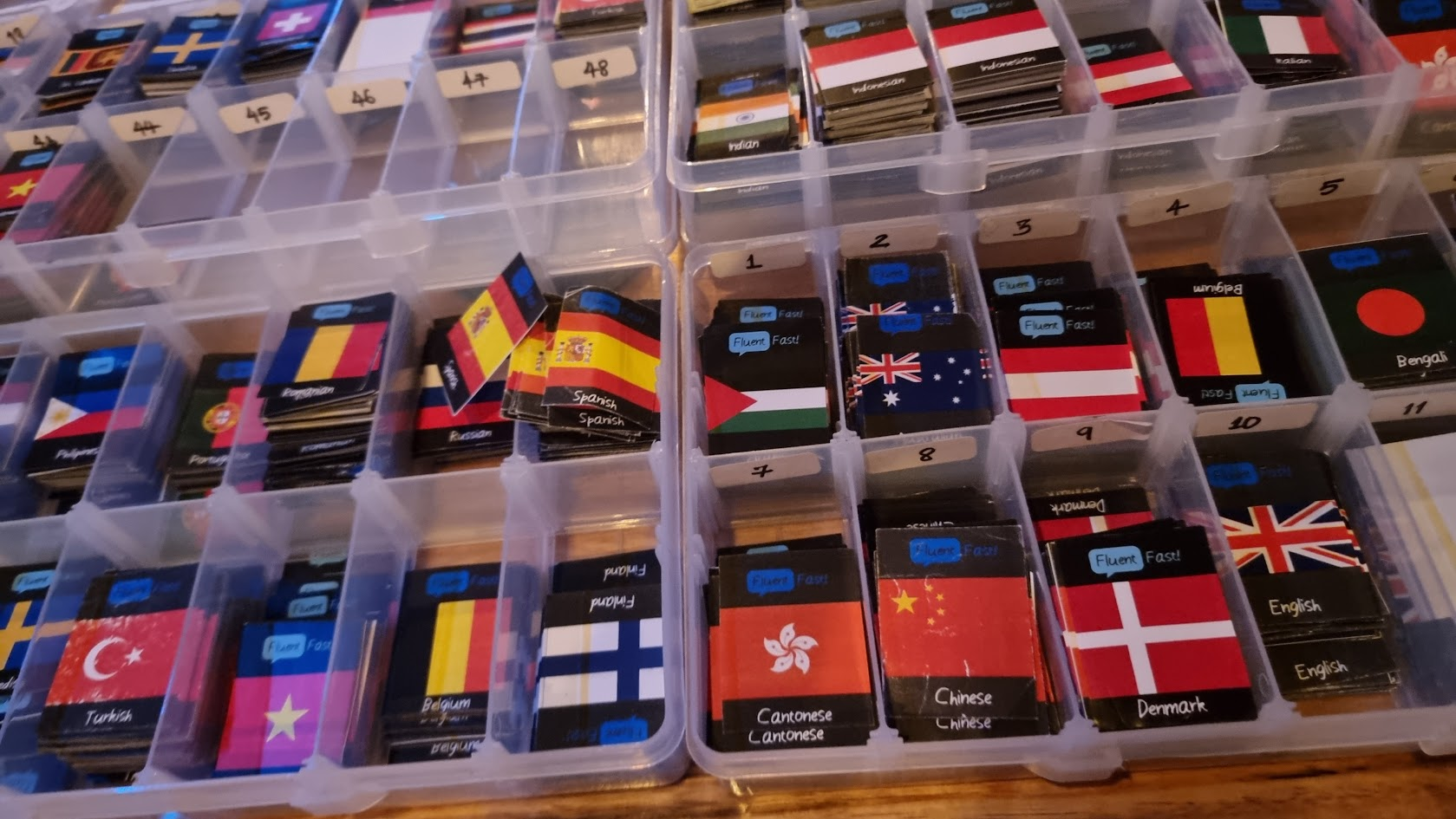
Is the event heavily structured?
Language exchanges are almost always "social" events and not heavily structured. This gives people the flexibility to practice if they want or to socialize or have a drink / dinner with people in a similar position as them.
Are there really "250 attendees"?
Yes, langauge exchanges are popular! We ussually have between 100 - 250 people attendees at our event.
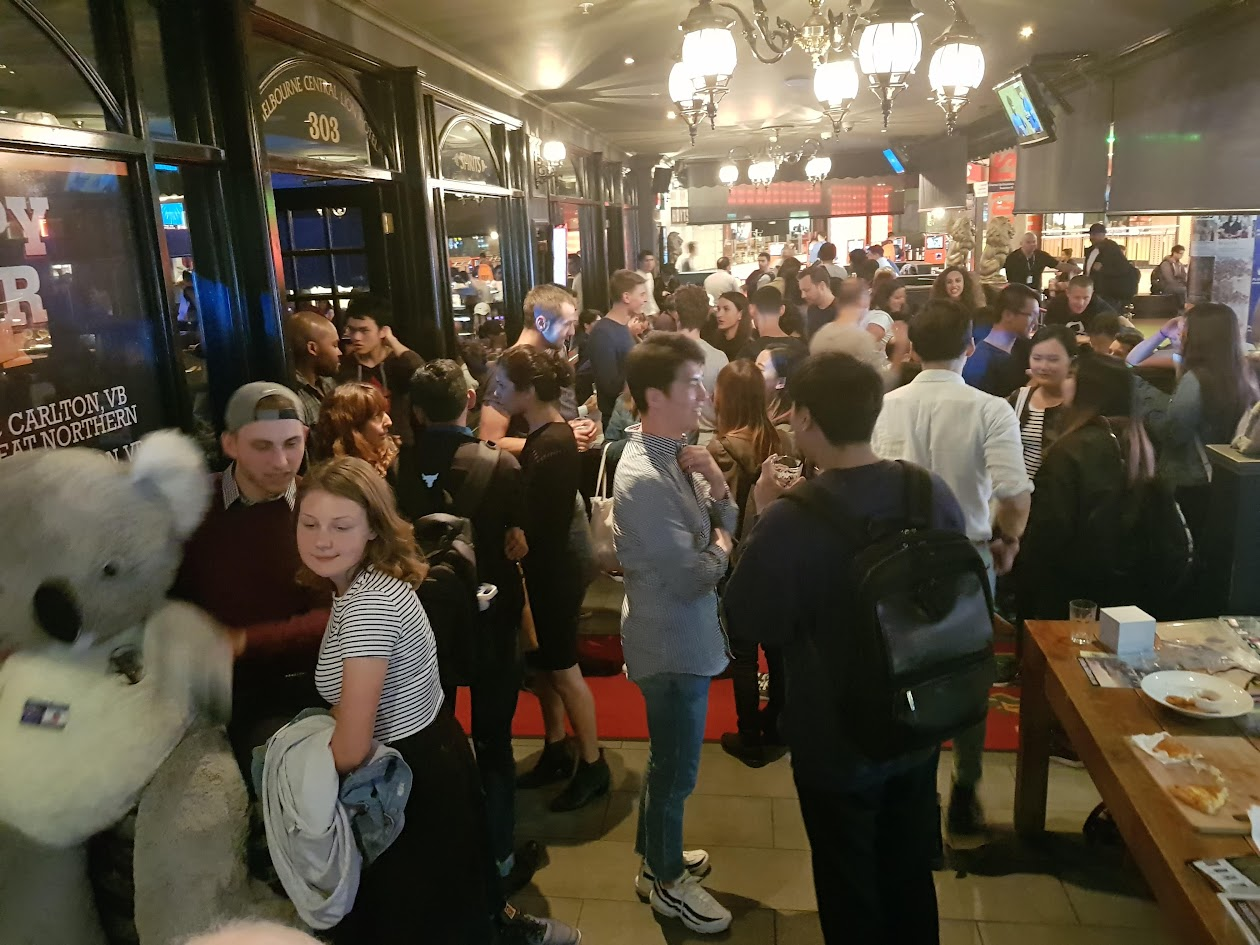
Language exchange at Melbourne Central Lion Hotel (Melbourne CBD)
How it's different (from other events):
The biggest difference at a language exchange (from other events like a bar, nightclub etc) is that people are (ussually) quite open to meeting and talking with new people. It's a great place to go to simply make friends and meet people.
Is it ok to attend solo?
Because it's easy to meet new people at a language exchange, going by yourself is very normal. If it’s your first time and you’re shy, the best phrase to remember is “hi, do you mind if I join your conversation?”.
However there are some advantages to attending with friends (english or uni school friends for instance) which I'll cover later on.
Start time and dinner:
Most language exachanges (ours included) runs from 6pm to 8pm or 9pm. This is a really good week night activity as you won't be staying out late. However, try to pick a language exchange that has a good kitchen with well priced food - as the event is around dinner time. It's worth paying for dinner both to support the venue that's hosting the group but also because you'll enjoy the event more if you're not hungry the whole time.
Not let's get into the tips so you can get the most from the event:
Tip #1: Arrive early / Meet people while they are fresh

Language exchange group
If you arrive 2 hours after the event starts, people are often already in a group talking, locked into their seats and in general have already had 5 conversations with new people and simply put: they have lost their energy for more new people.
The best way to meet new people is arrive at the event early and be one of the first conversations for people.
Tip #2: Find the games table:
Language exchange organisers often provide games like Jenga. These can be a fun way to break the ice with new people.
Jenga at the language exchange
Some people also bring their own games and teach others. This is a fantastic way to meet new people.
Tip #3: Have a plan ready! (when you meet someone to practice with):
I personally use google translate when I meet someone who wants to practice a language with me. It's acctually one thing that has worked really well for me over the years. I try to find fun topics to talk about (like places to travel to or typical foods from my country or theirs).
If someone's english is terrible it's acctually really good as it allows me to use Google translate, slow down the conversation (to focus on comprehension) and translate / study different phrases with them. If they speak english well then we often end up talking mostly in english and I don't get to practice as much.
There's so many reasons this (google translate) approach has been a good experience for me:
If they completely don't understand a phrase or word, translating it to their native language also allows you to see the translation and study it.
We ussually end up laughing about / talking about our bad pronounciation on different words and phrases as we practice them.
you get a chance to hear how they say a phase - as their pronounciation may be different
they will correct the google translate - as it's sometimes wrong.
It allows you to show someone the spelling of that phrase screen (allongside a translation to their native language) which, again, allows you to see the phrase in the language you are learning. Both people benefit.
I've had some language partners really nervous about their poor english and in these situations, using Google translate has allowed me to slow down the conversation and greatly help their comprehension (while learning myself).
Alternative approach: I've also seen people bring note pads and simply choose a topic to talk about (travel, sports, hobbies etc) and discuss words around this, but I prefer google translate.
Tip #4: don't jump into language practice straight away:
Don't assume everyone wants to practice straight away. A lot of people attend language exchanges just to meet people / socialize, have a drink and some dinner. Many people often want to get to know you a bit before practicing.
Many people acctually use Language exhanges as a place to meet practice partners and then practice somewhere else (where there are less interuptions for instance).
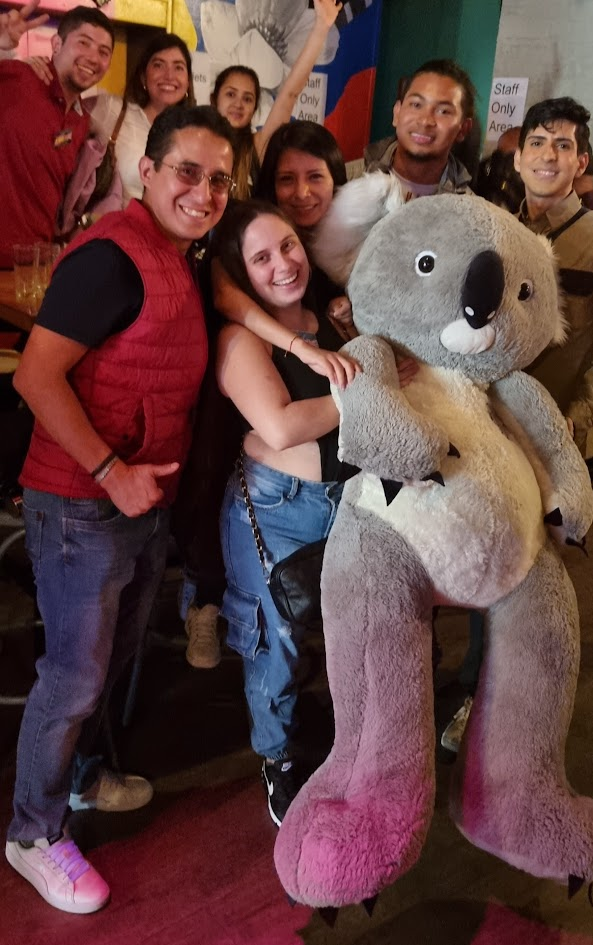
A group of people at Colombians & South Americans at our language exchange
Tip #5: Be a fun conversationalist:
Keep away from common questions, like: “where are you from”, “how long are you in Australia”, “what do you do for work?”. Try to find an interesting story or question to ask.
These questions will bore regulars to death. Try to find ways to “add” to the conversation like telling people an interesting story about where you are from or some of the differences between your country and Australia. This is a great way to start a conversation.
This is especially true if you want to talk to the organiser: they've been asked about 100 times "how long have you been running this event?", "why did you start it?" etc.
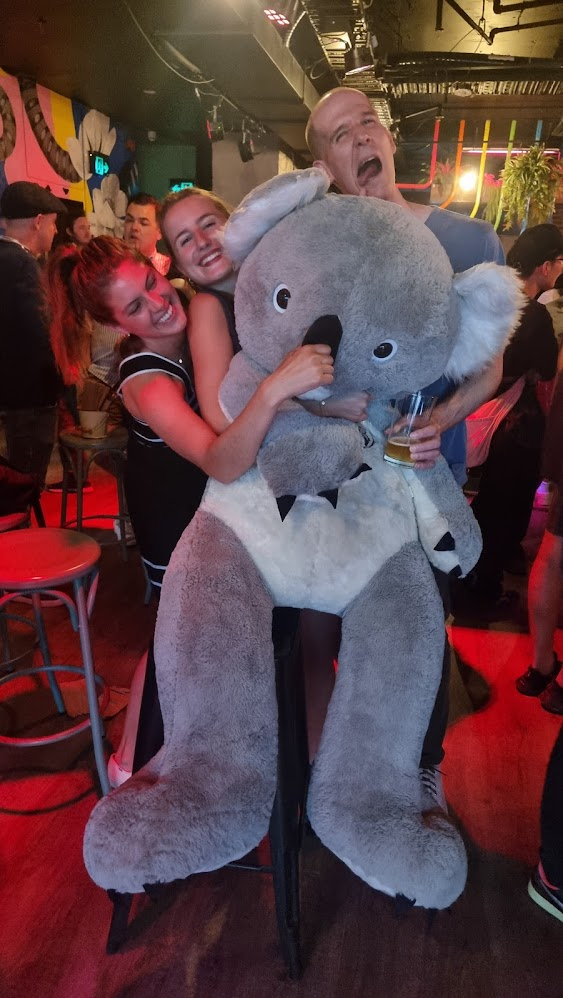
Tip #6: Attend with friends and attend regularly:
If you want a place to hang out with friends, a language exchange is perfect: they are ussually central, free entry and most people there are open to meeting new people. If you are sharing a table with friends, conversation will flow naturally and others at the table will pickup on the positive vibes - this is a great way to meet new people
As mentioned earlier, language exchanges are a great place to go solo, but we suggest inviting friends.
Attend regularly:
There's something special about meeting people each week and deepening your friendship. If you attend once or twice, don't expect to immediately have best friends, friendships take time to develop and shape. Language exchanges allow you to meet people each week and deepen that friendship.
Tip #7: Be ok with rejection / cold people:
Not everyone wants to talk with you unforuntately. If you go up to someone new and they give you a coldish response (their answers are short, they don't smile, they are looking around the room), that's ok - you are one person closer to finding people that are interested to talk.
Someone could have any reason to avoid talking to you: they're in a bad mood, they don't want to learn your language, they've already met 6 new people and are conversationally tired (this is a good reason to come early). None of these things are things you can control.
In the first 2 minutes of talking to someone new, you should be trying to figure out if they are open to talking with you. It's sometimes easy to forget that you approached them, so obviously you are interested to talk, but maybe they aren't.
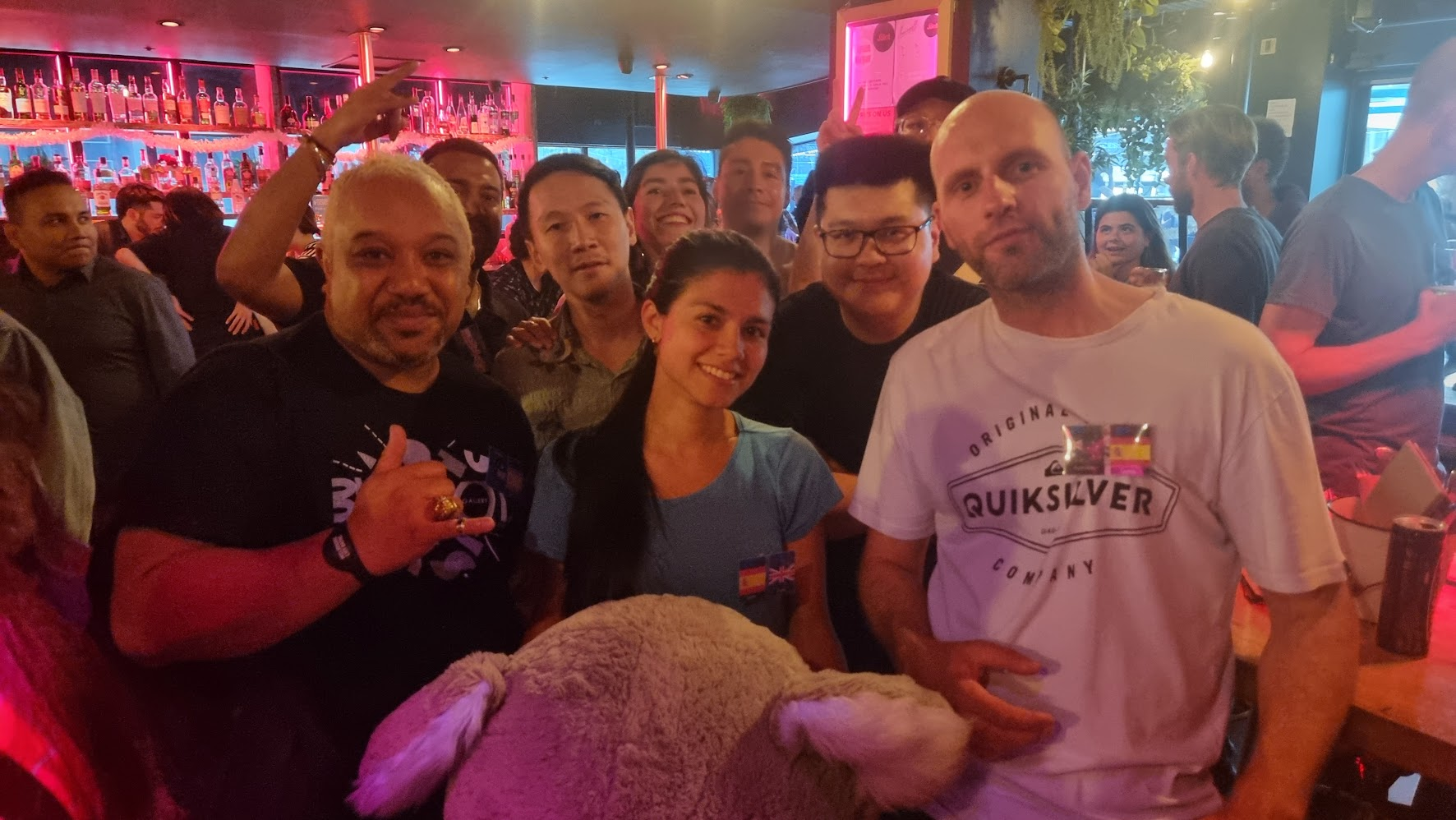
Tip #8: Volunteering at the event:
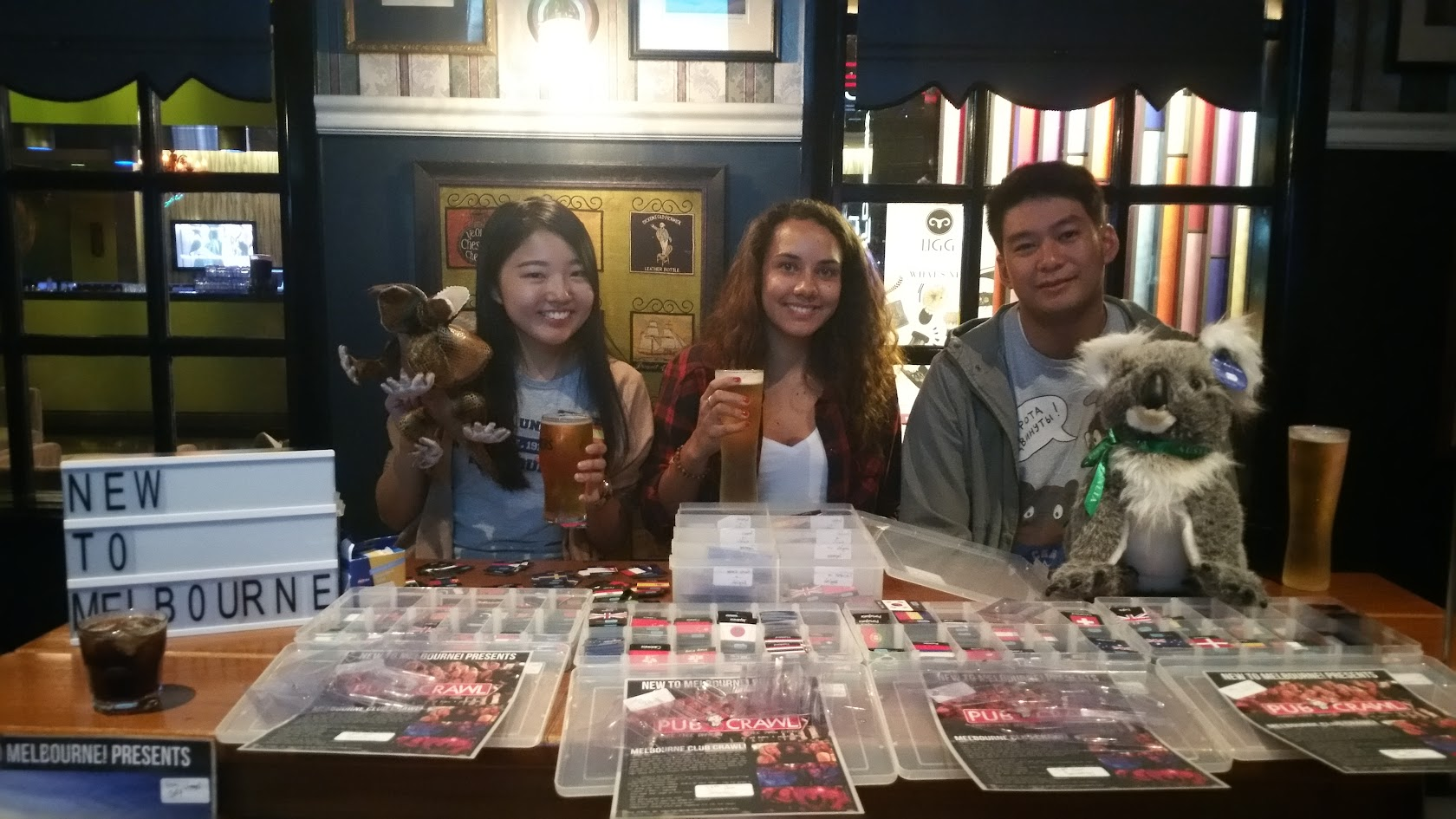
Language exchangnge volunteers

Our flags / "welcome" table - where we assemble attendees flags.
Language exchange organisers often let people volunteer at their events and for us; it's been an absoloute highlight of running our event.
We've run some of the biggest and most fun volunteer groups in language exchanges (by far), and I've seen other organisers struggle to build as an exciting group as ours. So some are better than others. But here's some of the reasons attendees look to volunter:
volunteers ussually get free drinks: beers/wine/tequila etc and sometimes free food for helping out (and welcoming attendees / assembling badges).
volunteers meet a lot of attendees quickly (as they are arriving). You can get a sense of who is in the room and who the people are you want to talk to (you can tell a lot about people by their body language) and meet up with them later.
an under appreciated detail: the other volunteers attend each week (so you get to know them over time - they don't simply appear once, never to be seen again).
There's often up to 7-10 people volunteering (at our language we take up to around 8 volunteers). We only need 2-3 max, but I've found that both I and the other volunteers love having a bigger group (people can take a break and talk to attendees etc).
It's fun helping people; welcoming attendees, assembling their badge and explaining how the event works.
however the biggest highlight is: meeting and connecting with the other volunteers. I've had a lot of people make really meaningful friendships in my volunteer group and this has been the best part by far. We pick volunteers that are outgoing, friendly and have really magnetic personalities (they need to be, as they are welcoming people to the event and shaping people's first impressions), so naturally they're really great people to connect with.
If you want to volunteer, just find the organiser and tell them. Personally (as an organiser) I like to first: talk to people (that are interested in volunteering) for 5 minutes to get a sense of their personality, their interests etc and then ask them to message our facebook / Instagram page (so I can followup or keep their details on record).
Tip #9: Know who the organiser is (they have free drink cards!):
The organisers know who the friendly people are and they ussually like to introduce people to each other (as they're trying to build a core group of regulars). Plus: they almost always have free drink cards! The organisers ussually can introduce you to the other regulars generally nice people with interesting stories (note: you generally want to meet regulars).
Summary:
Many people goto language exchanges unprepared, but I hope I've given you some key information so you're ready to make the most of the event. I hope you benefit from these tips and meet some fantastic people :-)
If you want to join our language exchange, you can find details on our homepage.